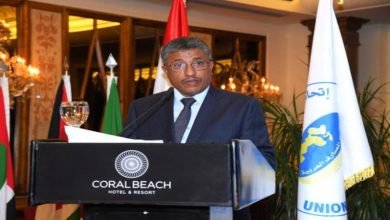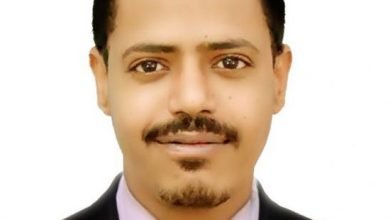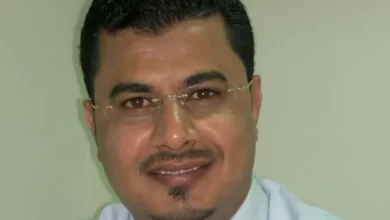Swedish Envoy to Yemen: Tragic Bloody Attack on Marib Must Stop

SMA NEWS – Riyadh
Sweden’s Special Envoy for Yemen, Ambassador Peter Semneby stressed that the conflict in the country needed a solution through a “broad and inclusive political process, starting with a nationwide ceasefire.”
In an interview to Asharq Al-Awsat, he said the Stockholm Agreement between the Yemeni parties averted a new humanitarian catastrophe in the coastal province of Hodeidah. He demanded a similar agreement be reached to halt the Iran-backed Houthi militias’ offensive on the Marib province.
The envoy refused to directly answer whether his country views the Houthis as an extremist, armed or political group, saying: “I do not want to characterize the Houthis or any other actor in this war.”
The Houthis recently launched several armed drones at Saudi civilian locations, including universities in Najran and Jazan, as well as the Jazan refinery. The attacks took place just days after the Kingdom offered a new peace initiative aimed at ending the war in Yemen. How do you interpret such actions?
Attacks on civilians are always unacceptable and are a violation of international humanitarian law. The United Nations, Sweden and other countries have made this clear on many occasions. These attacks are extremely dangerous and reckless, since many of them have been made against large population centers, risking major loss of life, and against infrastructure of significance far beyond Saudi Arabia, thereby endangering regional stability. Such escalation is not in the interest of anybody in Yemen. We urge those behind the attacks to consider this and to stop the attacks.
Are you in contact with the Houthis? What message are you relaying to them if you are?
Yes, we have regular dialogue with the Houthis since before the Stockholm talks in 2018 and continue to meet with them when the pandemic and other obstacles do not prevent us from doing so. Without giving any details of the contents of these contacts, I can say that we have been quite consistent in our messages to everybody involved in the war. Yemen’s problems must be resolved through a broad and inclusive political process, starting with a nationwide ceasefire. The ceasefire is the most important step to alleviate the humanitarian suffering. A ceasefire requires a minimum of trust between the parties, which can be demonstrated by steps from each side to de-escalate the confrontation. The most obvious place where the Houthis could do so is around Marib. In the end, all the citizens of Yemen, including the Houthis, will only prosper if they find a way of sharing power in a fair and equitable way and find a balanced and mutually beneficial relationship with Yemen’s neighbors.
Sweden hosted peace talks between the Yemeni parties two years ago, but so far the Yemenis have not seen the results of these consultations. What do you believe are the reasons for that?
I do not agree with the statement that there are no results of the Stockholm consultations and the Stockholm Agreement. The Stockholm Agreement prevented a humanitarian disaster in Hodeidah. It was the first significant agreement between the parties since the conflict started, and it therefore demonstrated that there is a viable alternative to fighting. It established a United Nations presence on the ground in Hodeidah, which has had a stabilizing influence, although its possibilities to work have been severely constrained. The exchange of prisoners that was announced in Stockholm has also been partially implemented.
At the same time, it is true that the redisposition of forces agreed in Stockholm has not been carried out, and there is no trust between the parties on the ground. But today the Hodeidah agreement can still provide an example for Marib, where we are facing a similar tragic situation. Just as we averted a humanitarian disaster as the government of Yemen and the Arab coalition agreed to stop their offensive on Hodeidah in 2018, the bloody and tragic assault on Marib should also stop. The key is first to save lives and then to move from a military to a political logic.
UN experts confirm that Iran is sending weapons and lending military expertise to the Houthis. It has also appointed an illegitimate ambassador in Sanaa. How do you view the Iranian role in Yemen?
There is an Iranian footprint in Yemen, and it has increased as the conflict continues. I do not believe, however, that the Houthis want to be totally dependent on Iran, although it is obvious that they welcomed assistance from it. Ultimately it will be important for the prosperity and security of the Houthis and all Yemenis to live in peace with and receive support from their immediate neighbors, the most important of which is Saudi Arabia.
For Iran, Yemen provides an opportunity, but not in terms of upping the stakes and escalating the situation in a country that is not of existential importance to Iran. Without doubt, Iran has influence with the Houthis; if Iran uses that influence in a constructive way, demonstrating a commitment to peace and to the UN efforts toward a political solution, this would also contribute to trust in Iran among world powers and would benefit other upcoming negotiations of great importance to Iran.
Some 450 African migrants were recently victims of an arson attacked committed by the Houthis at a detention center in Sanaa. How did you receive news of this crime?
The news of the fire in the migrant center was one of the most horrifying news items from Yemen in recent weeks. The migrants were already among the most vulnerable people, and they are, in fact, victims of several conflicts as they have decided to leave their homes and embark on a risky journey through war-torn Yemen. Those in charge in Sanaa are clearly responsible for the conditions in the camps. The event must be investigated, and the migrants have to receive assistance and protection.
Is Sweden ready to host any future consultations on Yemen?
The ongoing pandemic is making any physical meetings difficult. There are no plans for hosting Yemeni consultations in Sweden for the time being, but we continue to be ready to contribute if and when it is possible and useful and the parties agree. Meanwhile, we continue to work closely with the UN and we are in close touch with all major actors — in Yemen, in the region and beyond.
Yemen is enduring the worst humanitarian crisis in the world. How is Sweden helping in the humanitarian efforts?
Together with the UN and Switzerland, Sweden hosted humanitarian pledging conferences four times, most recently on March 1 this year. The total amount pledged – around 1.7 billion dollars – was larger than last year, but still falls significantly short of the UN appeal of 3.9 billion dollars. This amount also falls short of the target set to avert famine in Yemen. We therefore, continue our efforts among donors to generate more funding. Saudi Arabia was the largest donor, contributing 430 million. Sweden is a large donor in its own right in relation to its size, and we are also contributing to Yemen indirectly by being one of the largest contributors to the core budget of many of the UN humanitarian agencies that are present in Yemen.
Sweden has been paying special attention to supporting humanitarian programs for women, who are often particularly vulnerable during a war. In addition, Sweden is working actively as a member of the European Union to enhance humanitarian and other support through the EU.
Do you view the Houthis as an extremist group, political entity or armed militia, knowing that the militants believe they have divine mandate to rule Yemen?
I do not want to characterize the Houthis or any other actor in this war. It is up to them to demonstrate what they want and represent, and to make their adversaries develop sufficient trust in them to enter into negotiations with them and to ultimately strike an agreement, to become partners. This will be difficult, but it is not impossible.







